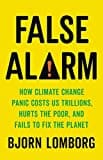Books Reviewed
“Much of what we are being told about the environment, including the climate, is wrong. And we desperately need to get it right,” writes Michael Shellenberger in Apocalypse Never: Why Environmental Alarmism Hurts Us All. A related argument can be found in Bjorn Lomborg’s new book, False Alarm: How Climate Change Panic Costs Us Trillions, Hurts the Poor, and Fails to Fix the Planet. Although Lomborg and Shellenberger have similar concerns, their approaches are quite different. Lomborg is coldly analytical and focuses squarely on climate policy. Shellenberger writes passionately about a broader range of environmental issues. Both books present important arguments for lay readers and policymakers alike, but Shellenberger’s ultimately proves the more satisfying and informative.
False Alarm builds on themes from Lomborg’s earlier work, The Skeptical Environmentalist (1998), which was arguably the most controversial and influential book on the environment written for a popular audience in the last quarter-century. It served as the intellectual wellspring of much contemporary free-market environmentalism. Marshaling a wealth of data, he showed that issues such as global warming, overpopulation, and energy shortages were not the dire crises environmentalists made them out to be. These were problems that could be solved by human ingenuity.
* * *
Lomborg is a gay vegetarian and was fleetingly a member of Greenpeace, so it was difficult for the media to tar him as a right-wing extremist. Nevertheless, The Skeptical Environmentalist provoked a storm of intellectually dishonest attacks within the scientific establishment, including in such formerly respectable outlets as Scientific American. It was an early sign of just how corrupted environmental science, policy, and advocacy had become. But Lomborg’s conclusions have largely held up well over the intervening decades. He used the book’s notoriety to launch the Copenhagen Consensus Center, a think tank which for the past 18 years has worked to develop innovative approaches to the world’s biggest environmental and economic challenges.
Shellenberger is something else altogether: Named a “Hero of the Environment” by Time magazine in 2008, he started out on the left wing of the environmental activist movement in the 1990s before moving to a more moderate perspective. In 2003 he co-founded an “ecomodernist” think tank, the Breakthrough Institute, with fellow dissident environmentalist Ted Nordhaus. Breakthrough was governed by the principle that “ecological vibrancy results from human prosperity, not the other way around.”
In the early 2000s, Breakthrough was perhaps the only intellectually serious bipartisan environmental group in America. I participated in various programs there over the course of more than a decade. It was a place where right-wingers who cared about the environment could engage in serious and good-faith intellectual dialogues with the environmental Left. Eventually, personal and political differences with Nordhaus led Shellenberger to leave Breakthrough and found the pro-nuclear group Environmental Progress in 2016. In 2018 he made a quixotic run for governor of California.
* * *
In many ways, Apocalypse Never is a better, worthier successor to The Skeptical Environmentalist than Lomborg’s own False Alarm. Like Lomborg, Shellenberger delivers sound and careful analysis. But he also weds that analysis to the story of his own compelling journey from radical environmentalism to environmental humanism. The book begins with a critique of Extinction Rebellion, a British group founded in 2018 that has tried to raise awareness about environmental issues by disrupting life in urban areas in the most irritating ways possible. The radicalism of such groups serves as a reminder of Shellenberger’s own youthful follies and a foil for his more mature approach. He illustrates his intellectual arguments against radical, and at many times establishment, environmentalism, with personal experiences as he travels from Brazil to Indonesia to the Congo to observe the failures of contemporary environmental policymaking. Theoretically, Shellenberger is not mining new ground here, but as a synthesizer, he is superb.
Shellenberger asserts that Apocalypse Never “makes the moral case for humanism…against the anti-humanism of apocalyptic environmentalism.” He refutes a litany of hoary environmentalist myths that have gained popular notoriety: deaths from natural disasters are down, not up; the dangers of plastic waste have been blown out of proportion; vegetarianism won’t save the planet; and rumors of impending human extinction have been greatly exaggerated. In fact, our capacity to increase food production has skyrocketed, and (contrary to the alarmist narrative) climate change is only a minor contributor to international conflict and the destruction of rainforests. Shellenberger usefully distinguishes the generally responsible science of the Intergovernmental Panel on Climate Change (IPCC) from the politicized alarm with which its findings are summarized for policymakers and breathlessly quoted by the media.
* * *
His critique of environmental alarmism can sometimes be quite damning, as when he notes that rich nations are “seeking to make poverty sustainable rather than to make poverty history.” He accuses many opponents of mercenary corruption, a charge which he sometimes takes too far. His indictments of natural gas magnate Aubrey McClendon for his donations to the Sierra Club, or of California Governor Jerry Brown for his receipt of Indonesian oil money may be on solid ground. But he is off base when he attempts to tie the anti-nuclear activism of my former Stanford colleague Mark Jacobson to his affiliation with a Stanford energy institute funded by a wealthy natural gas investor. (Jacobson is a victim of his own ideological mania, but it’s not because he’s being paid to do it.)
By and large, however, Shellenberger is entirely fair. He’s interested in far more than simple point-scoring; he’s offering a genuine pro-environment alternative to the current environmentalist movement. According to his ecomodernist philosophy, technology becomes more eco-friendly as it evolves to make more energy out of less raw material: nuclear energy is better than fossil fuels, which are better than wood; farmed salmon is better than wild salmon; and the petroleum industry saved whales from having their blubber harvested for oil. Apocalypse Never is thus firmly anti-Malthusian. “There is a pattern,” he writes. “Malthusians raise the alarm about resource or environmental problems and then attack the obvious technical solutions.”
Shellenberger is at his best when criticizing the religious fervor of modern environmentalism. He skewers prominent environmentalists from Naomi Oreskes to Bill McKibben as lifelong apocalyptics whose frantic doomsaying obscures scientific truth. “Environmentalism,” writes Shellenberger,
is the dominant secular religion of the educated, upper-middle-class elite…. It provides a new story about our collective and individual purpose. It designates…heroes and villains…. And it does so in the language of science, which provides it with legitimacy.
This argument, which strongly echoes those of University of Maryland economist Robert Nelson, will surely find many supporters on the Right.
* * *
Lomborg agrees that modern environmentalism has become a religion of hysteria. “We live in an age of fear,” he proclaims at the opening of False Alarm. The rest of the book shows why such fear is unwarranted. His basic approach to climate policy is sound, and he incisively analyzes the failures of the current global environmentalist movement. But his proposed solutions are far too simplistic to be considered serious policy prescriptions. His central suggestion is to encourage innovation so that entrepreneurs can find workable ways of adapting to our changing climate. In the meantime, he wants the government to put a price on carbon emissions and rebate the money to taxpayers through other means.
Though in theory a way of lowering emissions with the greatest economic efficiency, in practice carbon pricing rarely delivers the environmental benefits it promises. In dozens of jurisdictions where it has been applied throughout the world, it has been captured by special interests, such as California’s “cap and trade” program, which created an annual slush fund in excess of $1 billion to address everything from legitimate environmental issues to “affordable housing” to boondoggles funding inefficient public transit systems. Repeating this approach globally, as Lomborg suggests, is an order of magnitude harder and more foolish than doing it nationally or sub-nationally.
On some of the broader political issues surrounding climate science, he is more realistic. He is exactly right to say that handling climate change is more like treating diabetes than dealing with an asteroid. He correctly diagnoses the purely political roots of much climate policy, leading leftists to such laughable forms of resistance as calling China, the uber-villain of modern pollution, a climate leader. Like Apocalypse Never, False Alarm delights in debunking environmentalist canards that have gained currency in the public debate. Lomborg’s data-rich demonstration that cold weather presents a greater risk to overall human health than hot weather is excellent, and he does an outstanding job revealing the high price of Europe’s environmental “successes.” In order to reduce fossil fuels from 79 to 71% of primary energy since 2000, Europe has had to shed 2% of GDP (more than it spends on national defense).
* * *
Yet there are some things rotten in the state of Denmark. Years after The Skeptical Environmentalist, Lomborg continues to put too much faith in cost-benefit analysis, which involves weighing the positives and negatives of a given policy by weighing economic harms versus economic benefits. But naïve cost-benefit analysis does not account sufficiently for the “long tails” of extremely high risk—taking into account the fact that a cost could be one or more orders of magnitude higher than even a sincerely made point estimate. These factors could legitimately justify policies that would not pass muster under a naïve cost-benefit analysis.
Further, Lomborg casually refers to long-term climate models without indicting the modelers’ general approach. Imagine someone in 1940 attempting to model complex interactions between the economy and society in 2020, and you can get a sense of the hubris with which climate scientists project their findings into the future. He at times misses this central flaw in climate policymaking because he too implicitly shares the presumption that the far future can somehow be modeled accurately.
For Bjorn Lomborg, man is the measure of all things. The survival and welfare of animals or even nature itself, absent our appreciation of it, doesn’t figure into his calculations. This is fine as far as it goes, yet something is lacking in his utilitarianism: he never takes into account the majesties of creation that go beyond what can be captured in data. Michael Shellenberger, in the end, understands better why environmental concerns are compelling to the heart as well as the mind. “The stories we tell matter,” he writes. His own story will be recognizable to anyone who cares about the environment but has grown weary of irrational panic. He optimistically concludes that such people will prove to be in the majority: “Environmental humanism will eventually triumph over apocalyptic environmentalism, I believe, because the vast majority of people in the world want both prosperity and nature, not nature without prosperity.”





